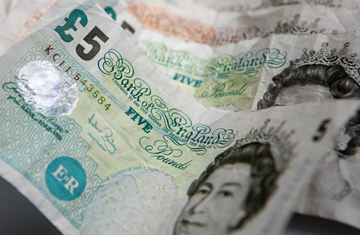
To the raft of complex remedies already prescribed to ease the pain of postrecession recovery, add an altogether simpler one: on June 28, British firm Bank Machine launched the U.K.'s first network of ATMs that dispense only £5 ($7.60) bills. According to the firm, the 21 machines filled with the smallest-denomination note available in the U.K. (picture U.S. ATMs that only give out $10 notes) could be the answer to helping Britons save more and spend less.
"This is about real people on real budgets facing their own spending cuts," Bank Machine managing director Ron Delnevo said in a statement. "There is cast-iron proof that cash — and small denominations in particular — helps people budget, especially now during these financially stretching times." Made more readily accessible, then, could small bills really help cash-strapped shoppers through a tight spot? According to behavioral economics — a fast-expanding field that probes how psychology influences our financial decision-making — Bank Machine is both right and wrong: having cash, and only cash, on hand is a good way to save — but only if the bills are big enough.
In a 2001 study, academics at MIT looked at two groups of people bidding for prized seats at a sold-out basketball game, one using credit cards, the other cash. It turned out that the participants using their credit cards on average offered more than twice the amount pledged by those paying cash. Another example, a 2008 paper by researchers from New York University (NYU) and the University of Maryland, shows that shoppers given gift certificates to spend in a store — along with the option of redeeming the certificates for cash they could keep — tended to spend more than those given cash to spend. (The latter group also had the option of not spending the cash and pocketing it instead.)
The reason: paying for something lessens the pleasure involved in acquiring it, behavioral economists suggest, with the more obvious the physical outflow of money, the bigger the psychological blow. So buying new shoes with a gift certificate hurts less than giving up crisp bills for the same pair. Credit cards, by ensuring no money changes hands until much later, ease that pain still further. Beating the urge to spend, in other words, means carrying your money in cash.
In that vein at least — that cash in the broadest sense helps us keep a lid on spending — Bank Machine's Delnevo has a point. For some hard-up Britons, then, shopping with £5 bills — or, indeed, £10, £20 or £50 notes, the other paper denominations issued by the Bank of England — could act as a brake on spending when compared to less fungible forms of money. Indeed, data collected by the Central Bank suggests that lower-income consumers prefer to shop with cash to help them better control their outgoings, and offering Britons the chance to take out a wider range of bills at the ATM could help them balance their budgets.
Carrying £5 notes is a challenge, though, if there are so few of them around. The notes made up almost 11% of the value of Bank of England bills in circulation in 1990. These days, they account for roughly 3%. Passed around as change far more than other notes, £5 bills make it back into Britain's wholesale distribution system less frequently than larger denominations do. That makes it more difficult to replace tatty notes and recirculate crisp ones. Meanwhile, ATM operators, worried their machines would require more frequent refills as well as more maintenance to clear dog-eared bills, have traditionally been reluctant to stock £5 notes.
Public demand for the bill, though, is high. Some 93% of payments in the U.K. valued under £5 are made in cash. No surprise, then, that according to the Bank of England close to half of the British public would go out of their way to use a less conveniently located ATM if they knew it stocked the fiver (as it's affectionately known). The central bank is working hard to boost the availability of a denomination it first introduced more than 200 years ago. In recent months, the Bank of England has run pilot projects with leading retail banks and supermarkets in an effort to make the case for the note, and it is publicly backing Bank Machine's new ATMs.
But here's the rub: there's little to suggest that carrying lower denominations in itself makes us smarter shoppers, as Bank Machine suggests. Granted, if you choose to withdraw only one note at a time from an ATM, the fact that you have the option to take out a £5 bill might mean you would skip purchases that would normally only be within reach with a higher-value note. But take out more, as most do, and the evidence suggests you'll spend more, not less, freely.
Another study by academics at NYU and the University of Maryland published last year found that participants were less likely to spend cash held in one large-denomination bill compared to several smaller ones. A natural reluctance to break notes means carrying a $20 bill in your wallet rather than 20 $1 bills makes you less likely to shell out in cash. Which means that Bank Machine's £5-only ATMs could actually achieve the opposite of their desired effect. "I could understand the wish to increase £5 notes in circulation if the goal is to get people to spend more," says Priya Raghubir, professor of marketing at NYU and one of the study's authors. "A larger-denomination note would get you to stop and think before making a purchase. A £5 note is less likely to." So to really tackle the effects of the recent recession, Britain needs to create £100 notes — and fill its ATMs with those instead.
